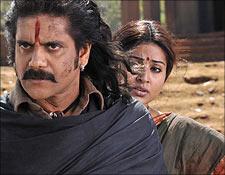 Radhika Rajamani feels that Telugu film Rajanna is quite impressive.
Radhika Rajamani feels that Telugu film Rajanna is quite impressive.Producing and acting in a part-historical and part-fictional tale, where the hero makes an entry 40 minutes into the film, requires guts, and Nagarjuna Akkineni has shown that courage in Rajanna.
Nagarjuna has chosen to produce a moving tale set against the freedom struggle and the Razakkar movement, inspired by real events and scripted by Vijayendra Prasad.
Vijayendra Prasad also makes an impressive directorial debut with this film where the action sequences were directed by his son S S Rajamouli.
When India won independence in 1947, Hyderabad was a princely state still ruled by the Nizam, though it had fallen into the hands of the Razakars, a private militia organised by Qasim Razvi to support the rule of the Nizam who did not want to join the Indian Union. Akkineni Nageswara Rao's voice-over gives the historical details about how the Razakars and the landlords were exploiting the local peasantry.
The film opens with the tale of Mallamma (Annie), a young girl brought up in Nellakondapalli village by a village elder she affectionately calls Thatha (grandpa). She is a good singer but incurs the wrath of the village head (the dorasani played by Shwetha Menon) who disapproves of her singling. When she hears about her father Rajanna's tale, Mallamma is inspired to fight for freedom from the Mallamma.
Rajanna and four of his friends fight the British, but when he returns to his village he find that the Razakars and landlords (doras) are oppressing the villagers. He inspires and motivates the villagers to revolt through his songs. When necessary, he resorts to arms. He is progressive in his thoughts as he talks of education, health, electricity and reforms for the village.
He meets Lachamma (Sneha) and saves her from a Razakar and later marries her. He and his friends die fighting the Razakars but not before saving the village and hoisting the Indian tricolour. The villagers
The film runs on two tracks as it narrates the tale of Rajanna and Mallama. Both struggle in their own way for freedom. Vijayendra Prasad seamlessly weaves together history and fiction into a heart-warming and touching story.
M M Keeravani's music and background score is outstanding. It's easy on the ear and in sync with the film's narrative. The folk feel of the music enhances the story. Some of the songs like Veyyi Veyyi, Gijigaadu, Amma Avani (the last song in raga Mohanam) are noteworthy.
High technical quality has been maintained with fine computer graphics, excellent camera work by Shyam K Naidu, Anil Bhandari and Poorna, good art direction (the village set looks pretty realistic) by Ravinder and tight editing by Kotagiri Venkateswara Rao. The Rajamouli touch is evident in the action sequences, which form the major part of Nagarjuna's role.
Details in the film are faithful to the period, be it in the costumes, sets, or make-up. The attention to detail in the styling is credited to Rama Rajamouli. The dialogues are punchy and jingoistic when necessary.
The first few minutes and the last few minutes belong to Annie and she has performed like a seasoned artiste. This young girl has the ability to keep viewers glued to the screen with her incredible performance. She tugs at the heart strings with her acting. She is really a talent to look out for.
Nagarjuna gets into the skin of the character and plays Rajanna with elan. He is exceptional in some songs like Veyyi Veyyi and in the last fight.
Sneha does her part (though not a very big one) well. Shwetha Menon plays the dorasani with gusto. Ajay, Pradeep Rawat, Supreet and Sravan, who play Rajanna's friends, fit the parts well. Nasserar has a small role as the music teacher, which he does well.
Nagarjuna should be congratulated for acting in and producing Rajanna, an impressive film.
Rediff Rating:











 © 2025
© 2025